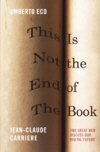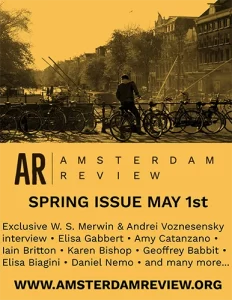This Is Not the End of the Book
As our age at an ever increasing rate gives birth to what is rightfully referred to as The Rise of the Digital, are printed books going to disappear? This is the largely opaque question at the heart of the lengthy conversation between two accomplished artistic European intellects that forms This Is Not the End of the Book. Umberto Eco is surely the more easily recognizable interlocutor here—his books In the Name of the Rose and Foucault’s Pendulum enjoy a broad readership, especially since the former was made into a film starring a young Christian Slater alongside Sean Connery. Yet Jean-Claude Carrière is a no less distinguished literary figure. A French writer with numerous books to his name, though perhaps not an author widely recognized by English readers, he has also authored several screenplays for films which are likely quite familiar, such as The Unbearable Lightness of Being.
As our age at an ever increasing rate gives birth to what is rightfully referred to as The Rise of the Digital, are printed books going to disappear? This is the largely opaque question at the heart of the lengthy conversation between two accomplished artistic European intellects that forms This Is Not the End of the Book. Umberto Eco is surely the more easily recognizable interlocutor here—his books In the Name of the Rose and Foucault’s Pendulum enjoy a broad readership, especially since the former was made into a film starring a young Christian Slater alongside Sean Connery. Yet Jean-Claude Carrière is a no less distinguished literary figure. A French writer with numerous books to his name, though perhaps not an author widely recognized by English readers, he has also authored several screenplays for films which are likely quite familiar, such as The Unbearable Lightness of Being.
Both writers also collect rare books for their private libraries, sometimes spending lavish sums for what are known as “incunabula,” which Carrière succinctly describes as “all the books published between the invention of printing and the night of 31st December 1500. The Latin word incunabula refers to the ‘cradle’ of the history of the printed book—in other words, all the books printed in the fifteenth century.” Carrière’s own taste in collecting, however, is more or less all over the place as he says: “I am not a proper collector. I have just always bought books because I like them.” And “I have a particular taste for what you might call popular, or even burlesque and grotesque, French literature from the early seventeenth century, which has generally been underappreciated.” Meanwhile Eco is very much attracted to collecting in a particular area: “My collection is very focused. It is a Bibliotheca Semiologica Curiosa Lunatica Magica et Pneumatica, or ‘a collection dedicated to the occult and mistaken sciences’. For example, I have Ptolemy, who was wrong about the movement of the Earth, but not Galileo, who was right.” Eco is “fascinated by error, by bad faith and idiocy,” the irrefutable ultimate con: “Fakes put all attempts to create a theory of truth into question. If you have access to the authentic work, the source of inspiration, then it’s possible to ascertain whether or not something is a fake. It is much harder to prove that an authentic work is authentic.”
Carrière and Eco realize an easy, mutually satisfying rhythm in conversation, matching each other’s considerable heft of knowledge and solidly lending support to shared-in-common hypotheses. One of them will assert a judgment and the other draws upon his storehouse of knowledge for a complementary example. For instance, Eco: “When the state is too powerful, poetry stagnates. When the state is in crisis, as has been the case in Italy since just after the war, then art is free to say what it has to say . . . as power fades, some art forms are given a boost, and some not.” And thus Carrière: “Not a single book published in France between 1800 and 1814—the zenith of Napoleon’s power—is still read today. The painting was pompous, not to say pretentious . . . neither was there any music. Or theatre.” Not at all surprisingly, a European historical perspective is richly represented within this dialogue and this alone adds significant value to the exchange. These men know intimately well the matters of which they speak.
Unfortunately, for a book which addresses the past, current, and future status of The Book, this object itself sadly lacks any luster or attractive quality. The font alone is rather atrocious and far too huge in size. It looks as though the edition has been magnified to ease readability for the elderly or children. Indeed, in direct contrast to its contents, this book looks and feels as if it were meant for the young. This is of course an extremely odd thing. I assume it’s a reflection of the poor financial state of affairs all university presses are facing these days, but that just isn’t acceptable as an excuse. I trust that none of this is the case with the original French edition Ne pensez vous débarrasser des livres (Éditions Grasset & Fasquelle, 2009). It’s a shame to see something that could have made for a lovely small hardcover volume of around 100 or so pages be grotesquely spread across 336 pages in paperback. If this was done in hopes of mass market appeal, then it was a rather ridiculous dream of severely handicapped logic and is clearly anti-literary while of course (and unsurprisingly) truly American.





